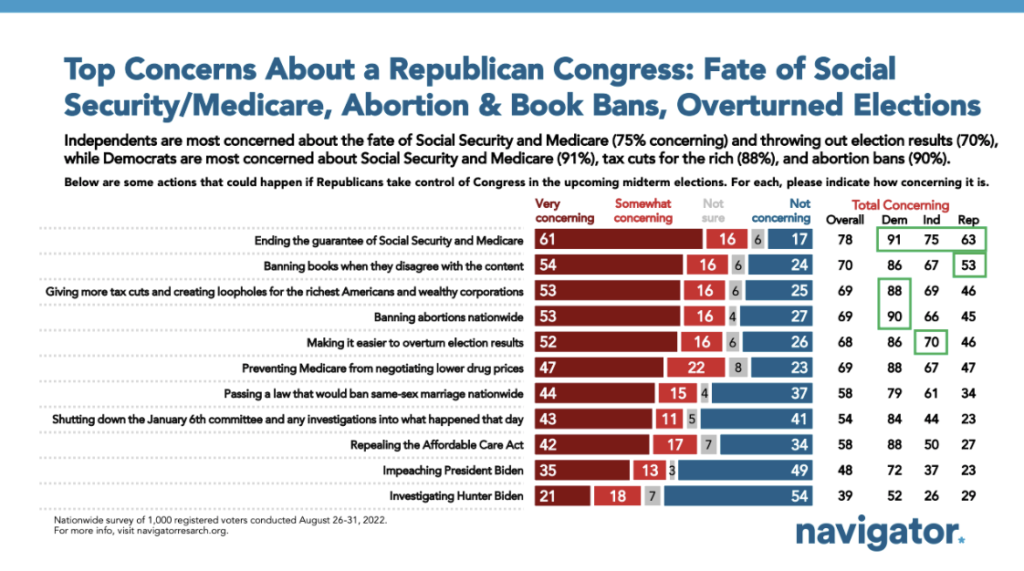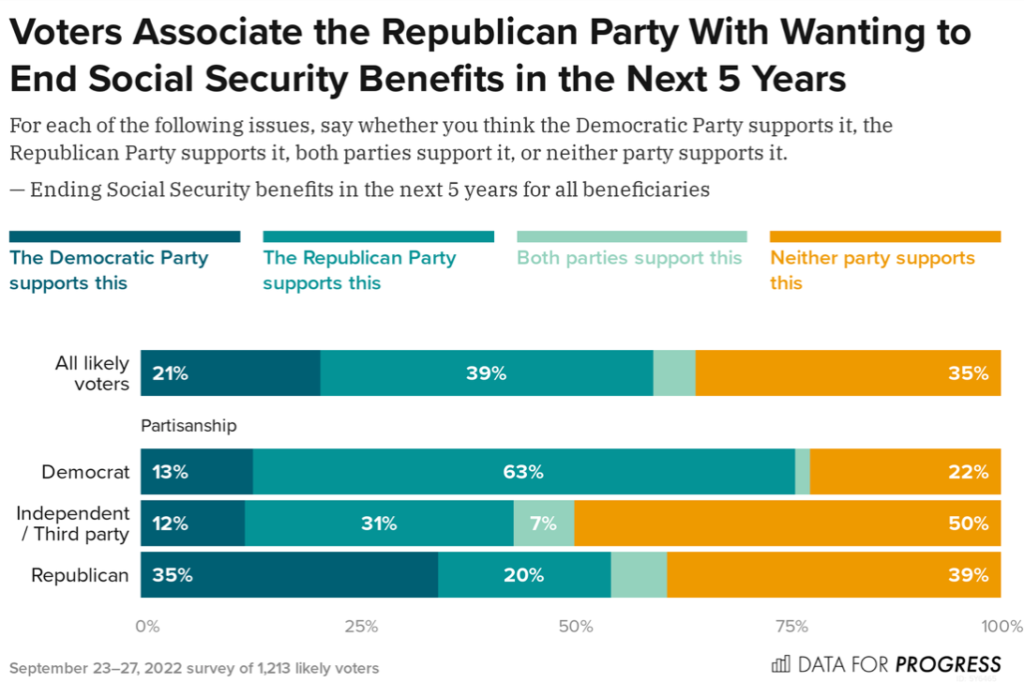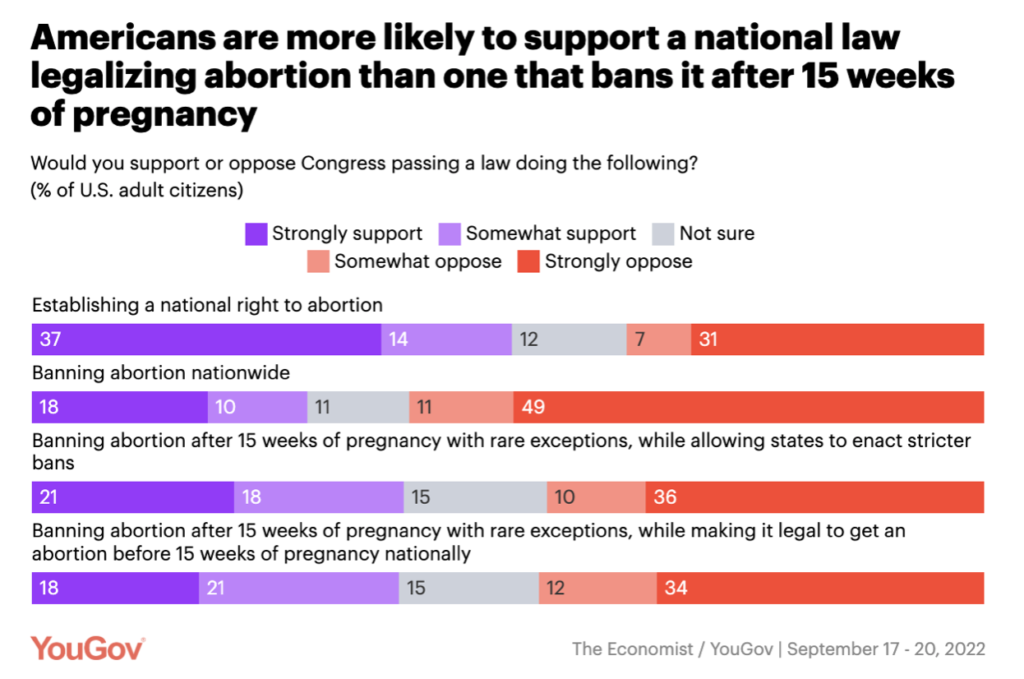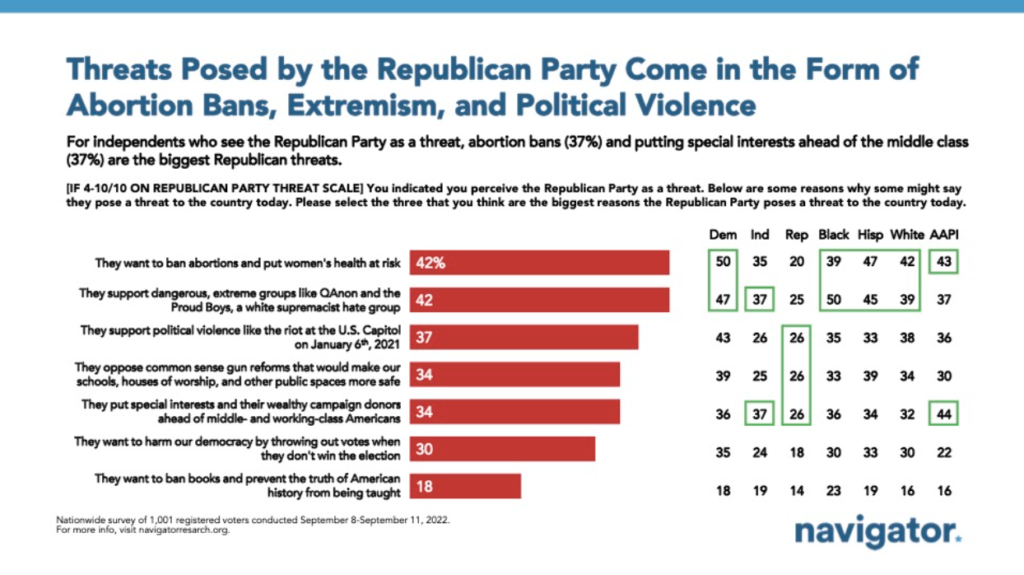Overview of Public Opinion on the Republican Agenda
To: Interested Parties
From: The House Accountability War Room
Re: Overview of Public Opinion on the Republican Agenda
Date: November 2022
Over the course of the last few months, House Republican lawmakers and candidates have outlined their plans for the recent takeover of the House of Representatives.
One thing is clear: polling shows that their priorities are deeply unpopular with the American people. That begins with the “Commitment to America” plan that Leader Kevin McCarthy previewed last September. A recent Navigator Research poll found that Americans oppose the House Republicans’ manifesto by an astonishing 24-point margin.
In fact, when you drill down further, polling from multiple sources indicate that virtually every single component of their proactive agenda has very little support from the public and is seen as putting corporate interests over people, taking away rights and freedoms from Americans and pushing an extremist agenda.
PUTTING CORPORATE INTERESTS OVER PEOPLE
Promise To Cut Social Security and Medicare. House Republicans have “embraced plans to reduce federal spending on Social Security and Medicare.” They’ve even suggested using the debt ceiling as a bargaining chip to force a reduction in Social Security.
Cuts To Social Security and Medicare Are Deeply Unpopular.
- A Navigator Research survey revealed concern around Republicans ending the guarantee of Social Security and Medicare (78 percent find this concerning). In fact, the most concerning and the most credible frame about Republican elected officials is wanting to make massive cuts to programs like Medicare and Social Security (66 percent find this concerning and 47 percent believe this to be true).
- Social Security is a particularly important program to most Americans. According to a Gallup poll, 57 percent of retirees depend on Social Security as a “major source of income.” Overall, only 6 percent of Americans said that they support cutting any government spending on Social Security.
- A Data for Progress poll also found 90 percent of Americans believe that Social Security should continue to exist ten years from now (90 percent), and Americans associate the Republican Party with wanting to end Social Security benefits in the next five years (39 percent).
- In a MaxDiff survey conducted in eight swing states by Data for Progress for Priorities USA, the most convincing message details the Republican plan to cut Social Security and Medicare in order to give tax breaks to the wealthy, revealing that Americans do not want to sacrifice essential social programs such as Social Security, Medicare, and the Affordable Care Act in order to line the pockets of wealthy individuals and corporations.
Promise To Raise Prescription Drug Prices. House Republicans have promised to repeal prescription drug provisions in the Inflation Reduction Act that would result in an increase in prescription drug prices. In fact, Rep. Kevin Brady, a senior member of the Ways and Means Committee, said the “drug provisions are so dangerous” and the repeal would be a “top priority for Republicans.”
Prohibiting Medicare From Negotiating With Prescription Drug Companies is Deeply Unpopular.
- A Navigator Research survey found that 69 percent found preventing Medicare from negotiating lower drug prices concerning.
Promise To Cut Taxes For Wealthy and Corporations. House Republicans say they will extend expiring provisions of the 2017 Trump tax cuts and repeal the Inflation Reduction Act provisions that require large, profitable corporations to pay their fair share of taxes. These policies would add $3 trillion to deficits over 10 years.
Cutting Taxes For The Wealthy Deeply Unpopular.
- A Navigator Research survey found that 69 percent say that giving more tax cuts and creating loopholes for the richest Americans and wealthy corporations was concerning.
Promises To Reimpose Monthly Student Debt Payments On 40 Million Americans. House Republicans say they will try to block the Biden Administration’s student debt relief plan.
Reimposing Student Debt Payments Deeply Popular.
- A Navigator Research survey found three in five Americans support the Biden administration actions canceling federal student loan debt (59 percent support – 36 percent oppose), including among Americans that currently have student loan debt (81 percent support – 13 percent oppose), Americans that have already paid off their student loan debt (55 percent support – 42 percent oppose), and Americans that have never had student loan debt (52 percent support – 42 percent oppose).


TAKING AWAY FREEDOMS
Promise To Criminalize Abortion. The Republicans Commitment to America plan is a push for a national abortion ban that would criminalize women’s health care. Rep. Kevin McCarthy has previously shown support for banning abortions at 15 weeks and, in September of this year, 101 House Republicans sponsored a national abortion ban, which could punish doctors for up to five years in prison if they violate the law, force women to have invasive transvaginal ultrasounds, and “effectively put an end” to prescribing abortion-inducing drugs during telemedicine appointments.
Attacks On Abortion Rights Deeply Unpopular.
- A Navigator Research survey found that Americans are overwhelmingly opposed to a national abortion ban, as proposed by Senate Republicans (net -44; 24 percent support – 68 percent oppose). A nationwide abortion ban is out of touch with Americans across party lines, including by four in five Democrats (net -67; 14 percent support – 81 percent oppose), seven in ten independents (net -54; 15 percent support – 69 percent oppose), and a majority of Republicans (net -14; 38 percent support – 52 percent oppose).
- A September survey by YouGov and the Economist found Americans are more likely to support a national law legalizing abortion than one banning it after 15 weeks of pregnancy, with 50 percent of Americans supporting a national right to an abortion (37 percent oppose), and just 29 percent supporting a national abortion ban (60 percent oppose).
- The best descriptors of Republicans who support nationwide abortion bans are “extreme” (27 percent), “dangerous” (27 percent), and “out of touch” (24 percent). Independents are most likely to label these Republicans as “extreme” (37 percent).

PUSHING EXTREMISM
Encouraging Political Violence & Supporting Extremist/Hate Groups The new House Republican caucus is filled with extremists who have repeatedly encouraged political violence, including in the lead up to the January 6th insurrection, and who support extremist and hate groups. This includes violent rhetoric from members like , Rep. Paul Gosar (R-AZ), Rep. Mike Collins (R-GA) and Rep. Andy Biggs (R-AZ). It includes Derrick Van Orden, a new freshman Republican who participated in the January 6th attack. And it includes Rep. Lauren Boebert (R-CO), has a “history of associating with militias,” Rep. Marjorie Taylor Greene (R-GA) who called QAnon “a once-in-a-lifetime opportunity to take this global cabal of Satan-worshiping pedophiles out.” And Rep. Matt Gaetz (R-FL) who spoke at a rally where the Proud Boys, a white supremacist group, provided security.
Americans that view the Republican Party as a threat to the country attribute this in part to their support of political violence and extremist groups. Navigator Research found the three biggest reasons for viewing the Republican Party as a threat included that “they want to ban abortions and put women’s health at risk” (42 percent), that “they support dangerous, extreme groups like QAnon and the Proud Boys, a white supremacist hate group” (42 percent), and that “they support political violence like the riot at the U.S. Capitol on January 6th, 2021” (37 percent). Supporting dangerous, extreme groups is the top reason among independents (37 percent).
- Americans are concerned by political violence and white supremacy. According to an Ipsos survey conducted for FiveThirtyEight, over nine in ten Democrats view white supremacist extremism as either a major or minor issue, while nearly three in five Republicans thought the same.
- According to a recent Reuters/Ipsos poll, 64 percent of Americans are concerned about violence following the results of an election, with Black Americans (40 percent) particularly concerned about violence following the midterm elections.
- A The New York Times/Siena Poll found that around seven in ten voters believe that democracy is at risk in the country, and among these voters, a plurality blame the government and government corruption as the threat to democracy.

